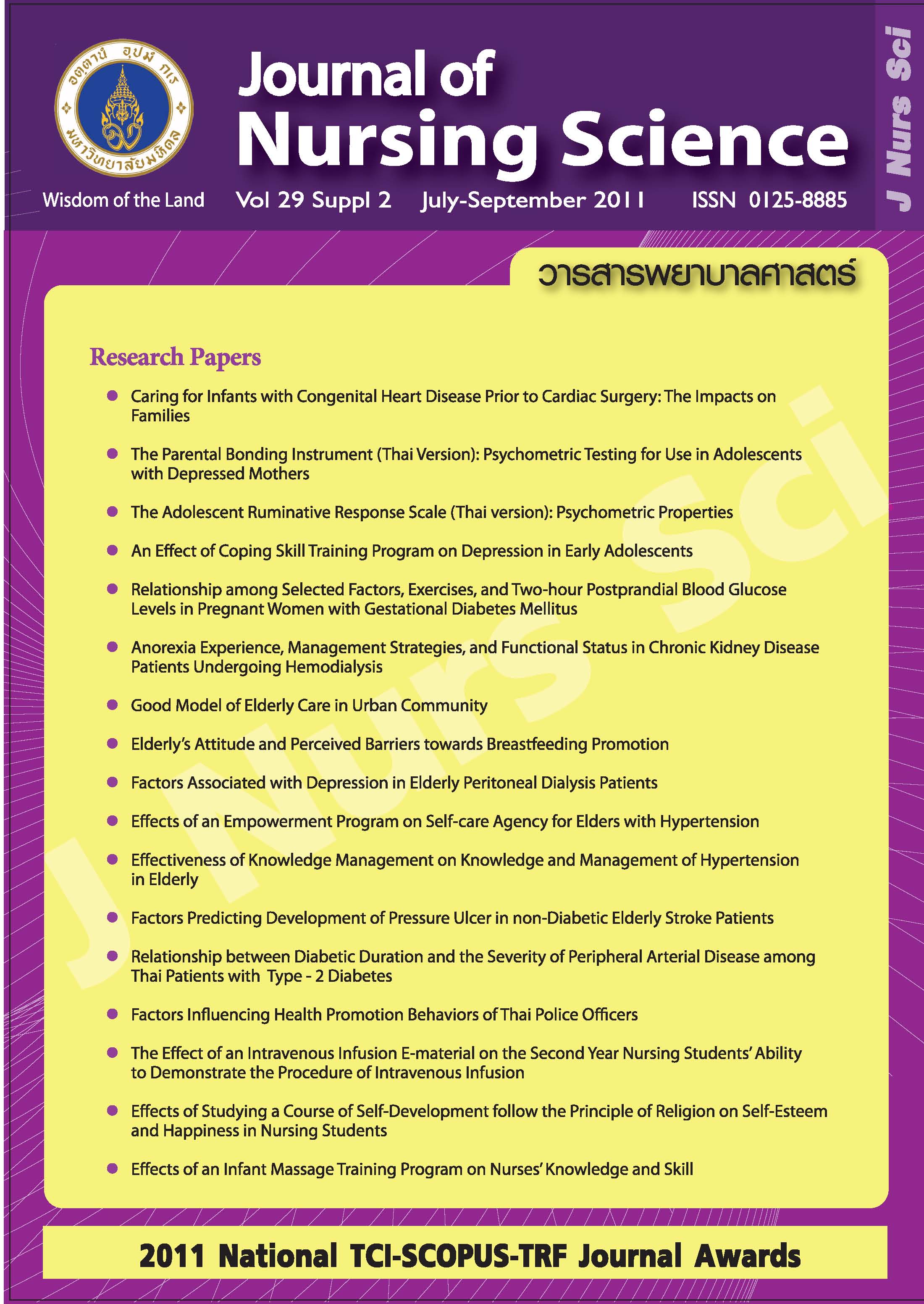Effects of Studying a Course of Self-Development follow the Principle of Religion on Self-Esteem and Happiness in Nursing Students
Main Article Content
Abstract
Purpose: This research aimed to investigate the effects of studyinga course of self-development follow the principle of religion onself-esteem and happiness in nursing students.
Design: A quasi- experimental study design.
Methods: A study sample consisted of 127 third year nursingstudents from a faculty of nursing in Bangkok. They were dividedinto intervention (n = 66) and control group (n = 61). Theintervention group attended a 54-hour course of self-developmentfollow the principle of religion. The control group attendedanother courses. The research instruments included a studentinformation form, a self-esteem questionnaire, and a happinessindex. For both intervention and control groups, a set ofquestionnaires were administered at baseline and after thecompletion of the course. Descriptive statistics and t-test wereused for data analysis.
Main findings: Upon completion of the self-development course,nursing students participating in the course had significantlyincreased self esteem and happiness when compared to those inthe control group.
Conclusion and recommendations: The findings support thebenefits of the course of self-development follow the principle ofreligion for enhancing the self-esteem and happiness in nursingstudents. Encouraging the nursing students to enroll this course ishighly recommended.
Article Details
Copyright Notice: Nursing Science Journal of Thailand has exclusive rights to publish and distribute the manuscript and all contents therein. Without the journal’s permission, the dissemination of the manuscript in another journal or online, and the reproduction of the manuscript for non-educational purpose are prohibited.

Disclaimer: The opinion expressed and figures provided in this journal, NSJT, are the sole responsibility of the authors. The editorial board bears no responsibility in this regard.
References
Phra Brahmagunabhorn (P. A. Pattutto). Buddhadhamma. 15th ed. Bangkok: Chanphen Publication; 2008.
Sukkhanil D. The roles of Buddhist Nurses in caring the end of life patients. [thesis]. Bangkok, Thailand: Mahidol University.; 2008.
Imudom P. Effects of self-evaluation of moral behaviors on elementary school students’ self-esteem: A solomon four-group experiment. (Thesis). Bangkok, Thailand: Chulalongkorn University.; 2008.
Doane GH. Win the spirit of creativity: the learning and teaching on ethics in nursing. J Adv Nurs. 2002;39(6):521-8.
Kongsuriyanavin W, et al. The effect of behavioral promotion by the use of Buddhist principles on nursing students’ behaviors. J Nurs Sci. 2003;21(3):48-59.
Kongsuriyanavin W, Tullayatorn P, Suchalearn B. The effects of practicing the insight meditation program on stress. J Nurs Sci. 2006;24(1):32-43.
Likitlersuang P. Wisdom psychotherapy- the nine basic steps. J Psychiatr Assoc Thailand. 2007;52(3):240-48.
Silpahit C & Silpakit O. Mindfulness meditation and mental well-being indicators. J Mental Health Thailand. 2008;16(1):253-60.
Losatiankij P, Teangtum S, Punchote K. The effect of mindfulness on stress, happiness and its usage in daily living. J Mental Health Thailand. 2006;14(3):199-206.
Puntumanawin D. Research analysis about moral and ethic in Thailand and international country. Bangkok: Prickwan graphic Co; 2008
Phra Brahmagunabhorn (P. A. Pattutto). Buddhadhamma. 7th ed. Bangkok: Plitham Publication; 2011.
Edwards D, Burnard P, Bennett K, Hebden, Una H. A longitudinal study of stress and self-esteem in student nurse. Nurse Education Today. 2010;30:78-84.
Erdfelder E, Faul F, & Buchner A. GPOWER:A general power analysis program. Behav Res Meth Instrum Comput. 1996;28:1-11
Rosenberg M. Society and the Adolescent Self-Image. NJ: Princeton University Press; 1965.
Srisang P. Self-esteem, stressful life events, social support, and postpartum depression in adolescent mothers in Thailand. (Dissertation). Case Western, USA: Case Western Reserve University.; 2003.
Silbert E & Tippett J. Self-esteem: Clinical assessment and measurement validation. Psychol Rep. 1965;16:1071-81.
Mongkol A, Wongpiromsan Y, Tungsaree T, Hathapanum W, Romsai P, Jutha W. Research report Development and testing of Thai Mental Health Indicator (Version 2007). Bangkok: The Department of Mental Health, Ministry of Public Health and Agricultural Credit Cooperatives of Thailand Printing; 2009.
Oguz-Duran N, Tezer E. Wellness and Selfesteem Among Turkish University Students.Int J Adv Counselling. 2009;31:32-44.
Lyubomirsky S, Tkach C, Dimatteo MR. What are the differences between happiness and self-esteem.? Soc Indic Res. 2006;78:363-404.


